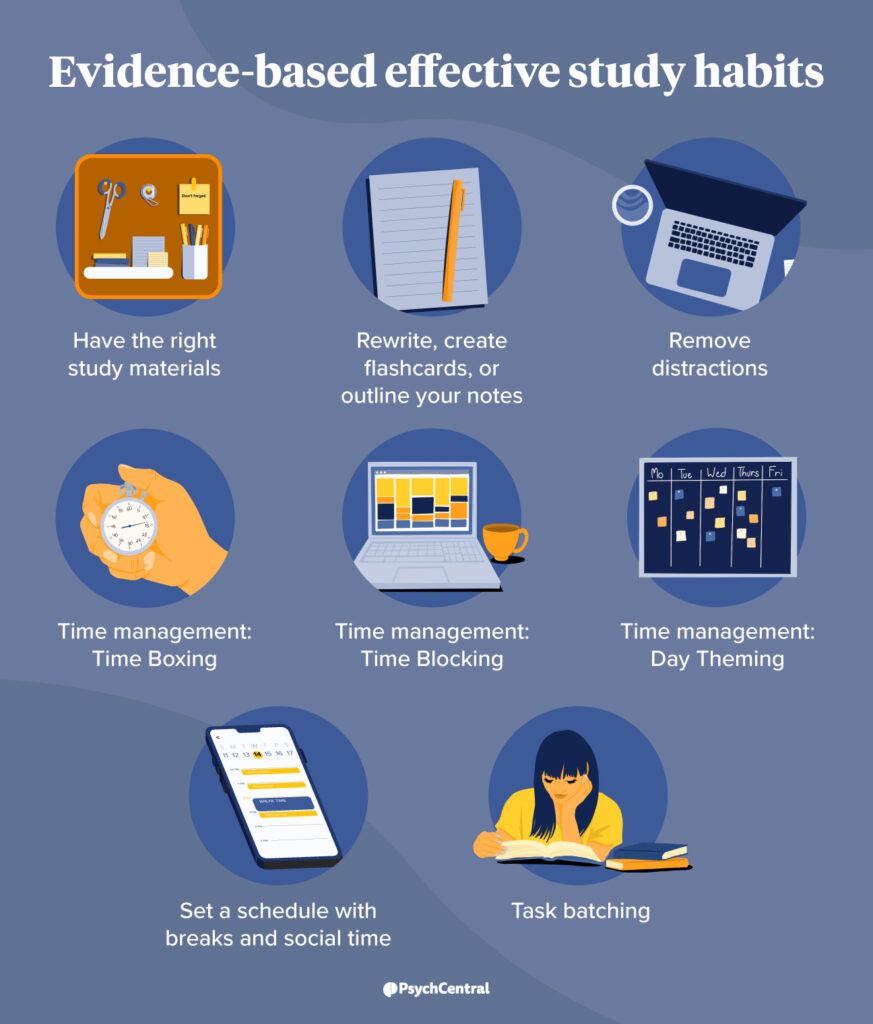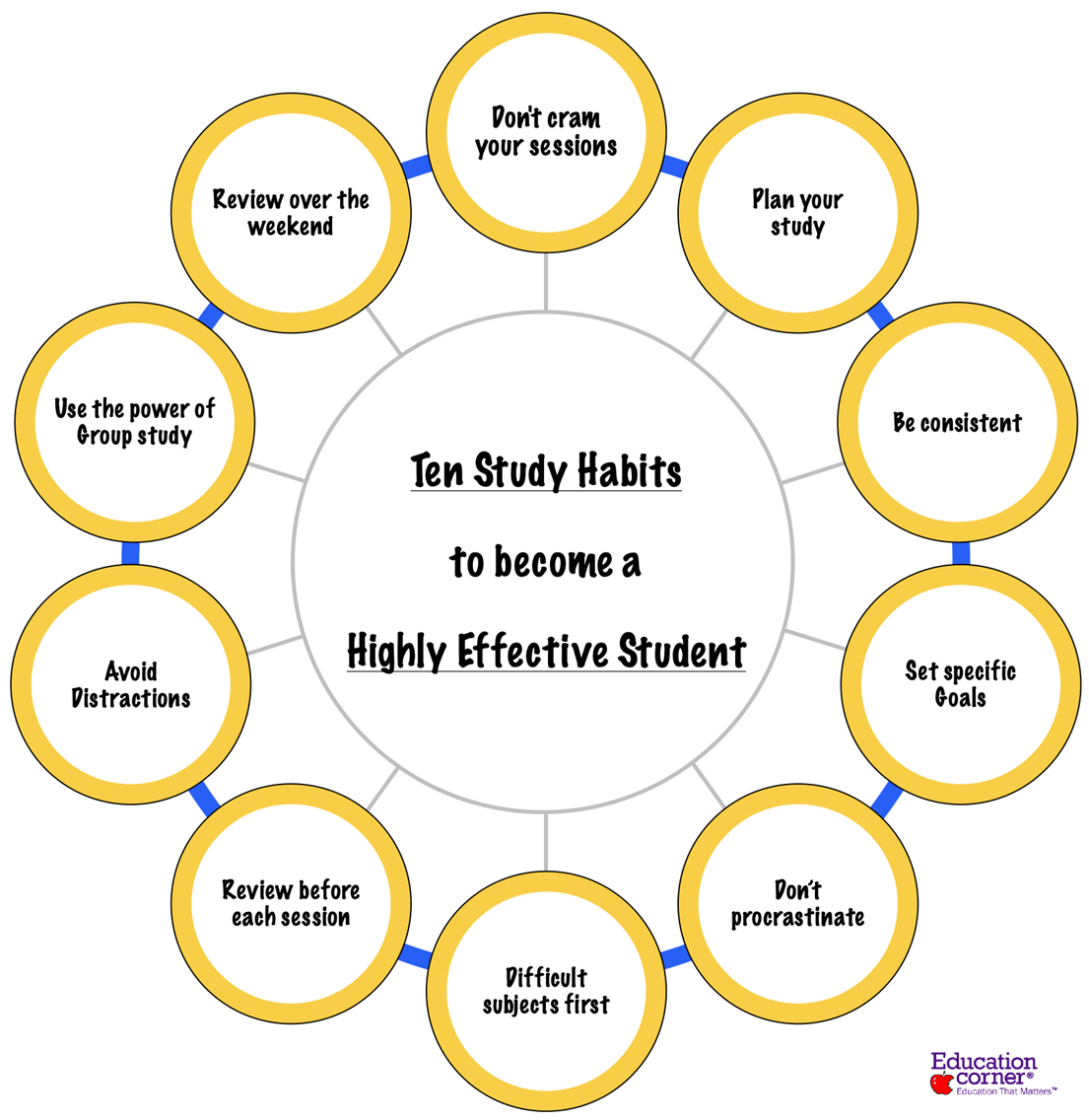The Ultimate Guide to Effective Study Habits: Boost Your Learning and Academic Success
Developing effective study habits is crucial for academic success. Whether you are a high school student, a university scholar, or pursuing further education, the way you study can significantly impact how well you retain information and perform in exams. This article will provide actionable tips and proven strategies to help you build efficient study habits that work for you.

Why Study Habits Matter
Study habits are the routines and practices you adopt to organize your study time and maximize your learning. Good habits make it easier to absorb information, retain knowledge, and apply what you’ve learned. Conversely, poor study habits can lead to stress, procrastination, and missed deadlines.
The most successful students understand that effective study habits are key to academic performance. These habits help you stay organized, reduce anxiety, and ensure that you’re not just memorizing facts but truly understanding the material.
1. Time Management: Your Study Foundation
Effective study habits begin with time management. Properly allocating time for studying, rest, and other activities can make a big difference in your productivity and stress levels.
Create a Study Schedule
One of the best ways to manage your time is by creating a study schedule. Set aside specific blocks of time each day for studying, and stick to it.
-
Prioritize your subjects: Focus on more difficult subjects during your most productive hours.
-
Break your study time into manageable chunks: Use techniques like the Pomodoro Method—study for 25 minutes, then take a 5-minute break.
Use a Planner or App
To stay organized, use a planner or study app to keep track of assignments, deadlines, and exams. Apps like Google Calendar, Notion, or Todoist can be great tools for scheduling and setting reminders.

2. Active Learning Techniques
Active learning involves engaging with the material actively, rather than just reading or listening passively. The more actively you interact with the information, the better you’ll retain it.
Use the SQ3R Method
SQ3R is an effective study method that helps you understand and retain information. It stands for:
-
Survey: Skim the material to get an overview.
-
Question: Turn the headings into questions.
-
Read: Read to answer those questions.
-
Recite: Summarize the key points in your own words.
-
Review: Review the material periodically.
This method is proven to enhance comprehension and memory retention.
Teach What You Learn
One of the best ways to reinforce what you’ve learned is to teach it. Try explaining the material to a friend or family member. By articulating the concepts, you force your brain to process and understand the information in a deeper way.
Utilize Flashcards
Flashcards are a simple yet powerful tool for reinforcing knowledge. Create flashcards with questions on one side and answers on the other. Use them for quick reviews and active recall exercises.
3. Minimize Distractions
Distractions are a major obstacle to effective studying. Whether it’s your phone, social media, or noisy environments, distractions can derail your focus and hinder your productivity.
Create a Distraction-Free Study Zone
Choose a quiet, comfortable place where you can focus. Ideally, your study space should be well-lit and free from distractions like your phone or television.
-
Turn off notifications: Put your phone on Do Not Disturb mode to avoid interruptions.
-
Declutter your workspace: Keep only the essentials on your desk to minimize distractions.
Use Focus-Enhancing Tools
There are several apps and tools designed to help you stay focused, such as Forest, which rewards you for staying off your phone, or Focus@Will, which provides concentration-boosting music.
4. Active Note-Taking for Better Retention
Taking notes is a critical part of the study process. However, simply copying down what your teacher or textbook says is not enough. Your notes should be actively engaged with the material to ensure better retention.
The Cornell Note-Taking System
The Cornell Method is one of the best ways to organize your notes. Divide your paper into three sections:
-
Cue column: For main ideas and questions.
-
Note-taking column: For detailed notes during lectures or reading.
-
Summary: A space at the bottom to write a summary of the content in your own words.
This method encourages active thinking and makes it easier to review your notes later.
Mind Mapping
Mind maps are excellent for visual learners. They help you connect ideas, organize thoughts, and see relationships between different concepts.
-
Use color: Color-code topics or categories to make the mind map easier to understand.
-
Branch out: Start with the central idea and expand outward with sub-topics and related points.

5. Review and Revise Regularly
Regular review and revision are crucial for long-term retention. Don’t wait until the night before the exam to start studying—this leads to cramming, which is much less effective.
Spaced Repetition
Spaced repetition is a technique that involves reviewing information at increasing intervals. By doing this, you’re reinforcing your memory over time, which helps prevent forgetting.
-
Use flashcards for spaced repetition: Apps like Anki or Quizlet use algorithms to help you review material at the optimal intervals.
-
Review material daily: Even if you’re not studying for an exam, reviewing your notes briefly each day will keep the material fresh in your mind.
Focus on Weak Areas
While reviewing, pay extra attention to the areas where you struggle the most. Devote additional time to these topics, and use active recall techniques to test your understanding.
6. Take Care of Your Body and Mind
Effective studying isn’t just about time management and study techniques—it’s also about taking care of your physical and mental health. A healthy body and mind will enhance your ability to focus, retain information, and perform well academically.
Get Enough Sleep
Sleep is essential for memory consolidation. Aim for at least 7-9 hours of sleep per night, especially during intense study periods.
-
Avoid all-nighters: Studies show that pulling an all-nighter can actually impair memory retention and cognitive performance.
-
Create a sleep routine: Going to bed and waking up at the same time each day can help regulate your sleep cycle.
Exercise Regularly
Regular exercise boosts blood flow to the brain and helps reduce stress, improving your overall cognitive function.
-
Take breaks: Use short breaks during study sessions to walk, stretch, or do light exercises.
-
Mindfulness: Practices like yoga or meditation can help clear your mind and reduce anxiety, making it easier to focus during study sessions.
FAQs About Effective Study Habits
1. What is the most effective study method?
There’s no one-size-fits-all answer, but methods like SQ3R, Pomodoro, and spaced repetition are popular and effective for most students.
2. How can I stop procrastinating while studying?
To overcome procrastination, break tasks into smaller chunks, set deadlines, and create a structured study plan. Use rewards as motivation and eliminate distractions.
3. How do I improve my memory for studying?
Use active recall, spaced repetition, and mnemonic devices to improve your memory. Also, make sure to get enough sleep, exercise regularly, and manage your stress levels.
4. How often should I review my study material?
Ideally, you should review your study material regularly—daily for shorter sessions, and more intensively during exams. Spaced repetition ensures long-term retention.
Conclusion
Building effective study habits is essential for academic success. By developing good time management, engaging with your material actively, and creating a distraction-free environment, you can improve your learning efficiency and perform better on exams. Remember, it’s not just about studying harder, but studying smarter. With the right habits, you can unlock your full potential and achieve academic excellence.
Start implementing these strategies today and see how your study sessions become more productive, efficient, and stress-free.








